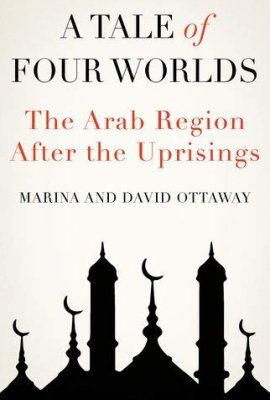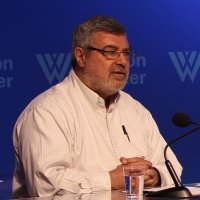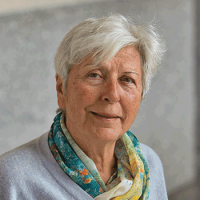Ten Years of Pan-Arab Protests: Understanding the new Dynamics of Change
On October 7, the Wilson Center’s Middle East Program hosted a panel discussion on protests in the Middle East and North Africa, almost a decade after the Arab Spring began. Panelists discussed the nature of current protest movements, the impact of the pandemic, and what the future of the region may hold. The following are excerpts from the discussion featuring Rami Khouri, Director of Global Engagement at the American University of Beirut, Ziad Abu-Rish, Co-Director of the MA Program in Human Rights and the Arts at Bard College, and Marina Ottaway, Wilson Center Middle East Fellow.
Related Publication

A Tale of Four Worlds: The Arab Region After the Uprisings
“The essential situation is that this mass of citizens has reached the point of discontent but desperation and therefore has done the only thing it sees as available to it other than immigrate, which is challenging their state openly in street protests. Something has to give between these two forces,” said Rami Khouri on the widespread pan-Arab protest movements and what they spell for the future of the region. 2020 marks a decade since the Arab Spring began in Tunisia, igniting a series of protests all across the Middle East. The force of these movements has not abated, though it has been transformed.
Throughout 2019 and in early 2020, the MENA region witnessed a series of new protests movements, spanning from Algeria and Sudan to Lebanon and Iraq. However, as the COVID-19 pandemic spread, these movements were largely forced to subside as countries enacted strict lockdowns. The consequences of the virus went even deeper: socioeconomic conditions and already existing inequalities were exacerbated by COVID-19. “The problems that brought people onto the streets in the first place continues so now you have a second flare-up,” Wilson Center Middle East Fellow, Marina Ottaway, noted. Lebanon and Iraq, as well as Tunisia, Morocco, and Jordan are all experiencing revived street protests as citizens are emerging from quarantine. This trajectory is unlikely to be abandoned any time soon. “What is happening in the Middle East actually has parallels globally. There is a return to mass protests as a tactic for change,” added Ziad Abu-Rish, a Middle East Historian at Bard College.
Despite the hopes for a better future at the center of these movements, it is important to remember that continuity can and will prevail. Abu-Rish points to the example of Tunisia: “While, I think, Tunisia is a success in political terms, I think those who have been working on economic development in the country are very disappointed to see the continuity of the very same policies that were in place prior to the overthrow of the Ben Ali regime.” Furthermore, there is not always a coalition among those seeking change. Multiple competing visions are represented, with limited agreement on what system should replace the existing status quo. Ottaway pointed out that “people have different ideas of what they want as citizens.”
Ultimately, the outcome of these movements is far from guaranteed. All we can know for certain, Khouri said, “is that there are new citizens with new dimensions to their inner and their external public lives and these changes will not go away but are permanent. How people come together and how they bring about change has been transformed.”
The Role of COVID-19
COVID-19 has significantly impacted the protest movements. All three panelists agreed that the pandemic had revealed the tears in the seams of Arab societies and, consequently, reignited street protests once lockdowns were lifted. Abu-Rish also pointed out that COVID-19 has transformed the nature of protests. “In the wake [of COVID-19 and the August explosion] Lebanese activists have turned much more towards strategically targeted protests, specifically at the Central Bank and the Parliament as symbols of the status quo.” Mass protests may no longer be an option, but smaller, strategically planned gatherings are capable of making a big impact.
Evolution of the Protest Movements
The people that took to the streets in 2010, at the beginning of the Arab Spring, are very different from those calling for change now, according to Ottaway: “The people who took to the street in Tunisia and Egypt in 2010 and 2011 were really very naïve about what was going to happen and what was required to bring about change. The second wave of protestors have a much greater awareness about how difficult the process is going to be and know the importance of conducting the protests on a sustainable basis,” she commented. There is a wholesale transformation of Arab societies occurring, accelerating and expanding. However, the ruling elites have remained static, refusing to acknowledge the social revolution occurring around them. Ultimately, though, change will have to come from the top. Ottaway argued, “I don’t mean to dismiss the importance of protests and the importance of grassroots mobilization, but in the end, it is those people who control the levers of power that have to make the changes. Only they have the capacity to implement them.”
Nevertheless, hope is not lost. Change has already taken place; Khouri posited that the shifting mindset of the Arab people will continue to animate the protests. “The changes are inside people’s souls and their psyches and in their hearts and their minds, in their own sense of identity. People individually are changing and therefore when they work together social action is changing and social norms are changing. Ultimately, the norms of political engagement and mechanisms will have to change too.”
Speakers

Distinguished Public Policy Fellow at the American University of Beirut, Arab Center Washington Senior Fellow; Al Jazeera columnist; Author

Former Senior Research Associate and Head of the Middle East Program, Carnegie Endowment for International Peace

Moderator

Hosted By

Middle East Program
The Wilson Center’s Middle East Program serves as a crucial resource for the policymaking community and beyond, providing analyses and research that helps inform US foreign policymaking, stimulates public debate, and expands knowledge about issues in the wider Middle East and North Africa (MENA) region. Read more
